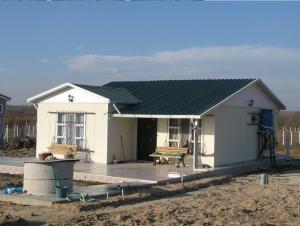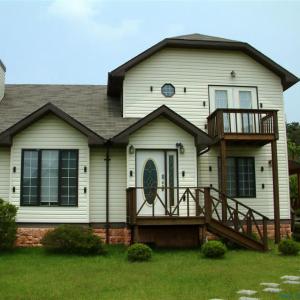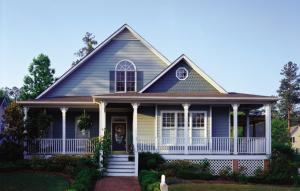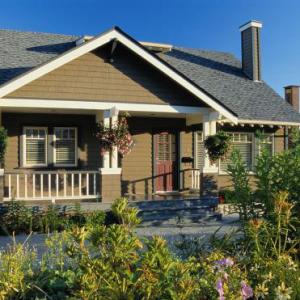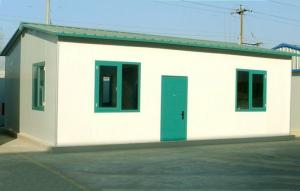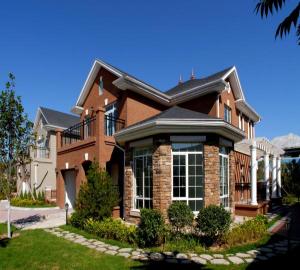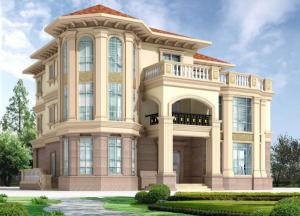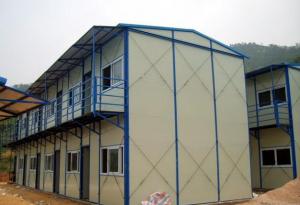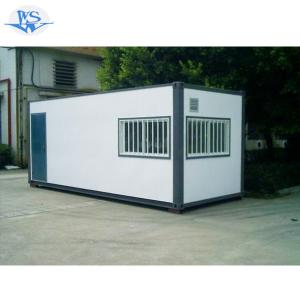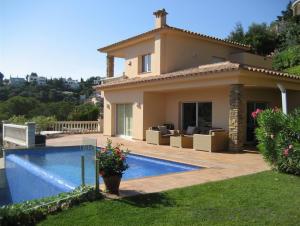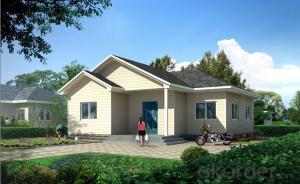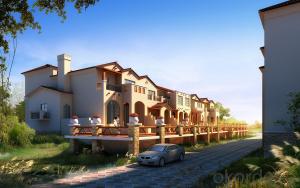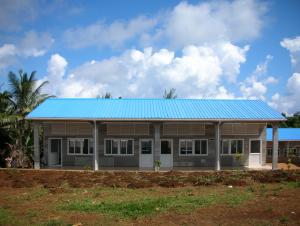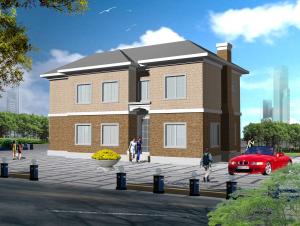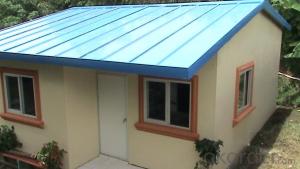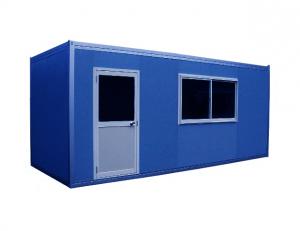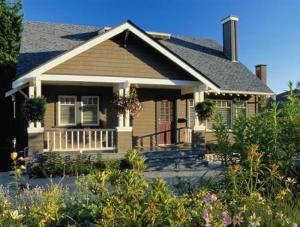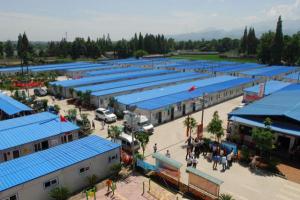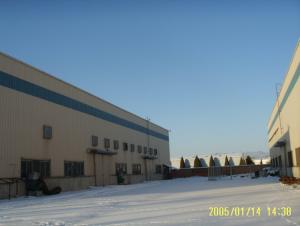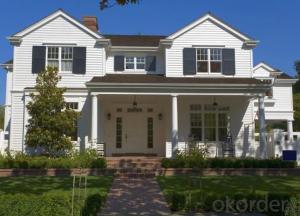Light Steel Construction Prefabricated House from China
- Loading Port:
- Shanghai
- Payment Terms:
- TT OR LC
- Min Order Qty:
- 50 m²
- Supply Capability:
- 50000 m²/month
OKorder Service Pledge
OKorder Financial Service
You Might Also Like
Light Steel Construction Prefabricated House from China
Specifications
Specifications prefabricated homes
1.Qualified material
2.Flexible design
3.Fast installation
prefabricated steel building Feature:
* Prefabrication, easy to install and disassemble
* Precision works, long life-span up to 15 years for use
* Lightness, easy to transport and relocate
* Using several times and recycling, economy and environment friendly
Prefab house Main material list as following:
Wall: 50mm/75mm thick EPS/Rockwool/PU sandwich panel
Roof: 50mm/75mm thick EPS/Rockwool/PU corrugated sandwich panel
Window: UPVC or Aluminum sliding window
Door: aluminum frame with panel same as wall panels(security door as optional)
Prefab house Joint material: steel column/aluminum alloy
1. Free from the damages by inspects, such as white ants and so on
2. Steel code: Q345, Q235
3. Designed life span: more than 30 years;
4. Green and environment-friendly materials used;
5. Seismic resistance up to 8 magnitudes
6. Safe---Able to stands for maximum 55 m/s typhoon
7. Advanced roof and wall cladding material guarantee excellent acoustic insulation, less 65% energy consumption than the concrete structure.
8. Additional 10%-15% net area compared to the traditional building, air cavity between the cladding and main structure guarantees the comfortable indoor space.
Prefab house advantage
1. Easy and quick to install;
2. Excellent load and span capabilities;
3. Significant savings in site installation costs;
4. Panel comes in a range of aesthetically pleasuring colors;
5. Energy saving thermal insulation;
6. Superior air tightness for controlled environments;
7. Good reactions to fire properties;
8. Durable, long lasting, stood the test of time in the extremes of harsh climate
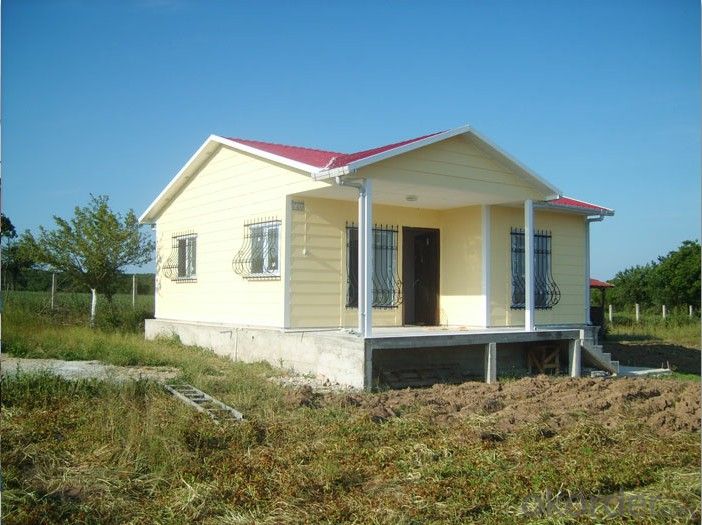
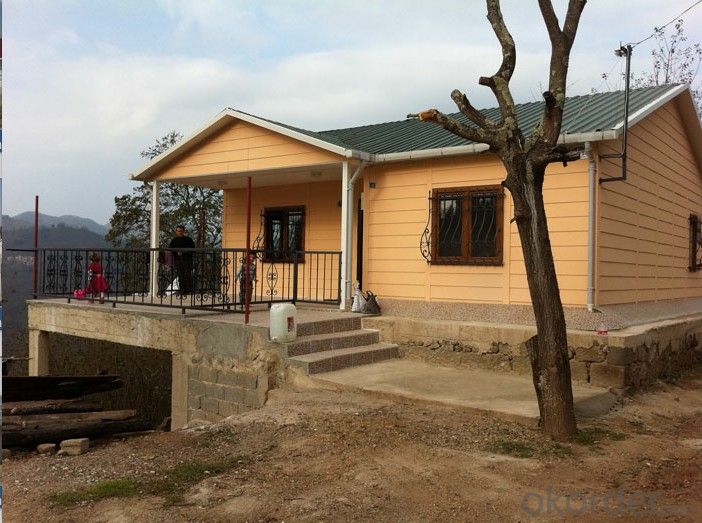
- Q: Can container houses be built with a traditional architectural style?
- Traditional architectural styles can indeed be implemented in the construction of container houses. Although containers are often associated with modern or industrial designs, they can be altered and planned to resemble conventional homes. Architects and designers have come up with innovative methods to include traditional elements, such as pitched roofs, dormer windows, porches, and even decorative features like moldings and trims, into container houses. By utilizing multiple containers, stacking or arranging them in diverse configurations, and incorporating regular building materials, container houses can be converted to imitate the look of a traditional home while still benefiting from the durability and sustainability of shipping containers. Furthermore, the interiors of container houses can also be designed in a traditional style, using materials like wood, stone, or brick to create a cozy and welcoming atmosphere. Ultimately, container houses offer flexibility in design, allowing for the integration of various architectural styles, including traditional ones.
- Q: Are container houses suitable for all climates?
- Container houses can be suitable for all climates, but certain modifications and considerations need to be made to ensure their suitability. Factors such as insulation, ventilation, and weatherproofing are crucial in making container houses comfortable and energy-efficient in extreme climates. With proper planning and implementation of these modifications, container houses can be adapted to withstand the challenges posed by various climates.
- Q: Can container houses withstand natural disasters?
- Yes, container houses can withstand natural disasters. The use of durable steel containers as the primary building material makes them highly resistant to extreme weather conditions such as hurricanes, earthquakes, and wildfires. Additionally, these houses can be reinforced and designed with proper structural engineering to ensure their stability and safety during natural disasters.
- Q: Are container houses structurally sound?
- Yes, container houses are structurally sound. They are built using strong and durable materials, such as steel, which provide excellent structural integrity. Additionally, container houses undergo rigorous testing and engineering to ensure they meet building codes and safety standards.
- Q: Are container houses suitable for co-working or shared office spaces?
- Depending on the specific needs and requirements of individuals or businesses, container houses can serve as a suitable choice for co-working or shared office spaces. These houses possess a range of advantages that make them appealing for such purposes. To begin with, container houses offer a relatively affordable and cost-effective alternative to traditional office spaces. They can be easily converted into functional workspaces at a fraction of the cost required to construct a new building. This affordability is especially advantageous for startups, freelancers, or small businesses operating with limited budgets. Moreover, container houses are highly customizable and flexible. They can be modified and designed to meet the specific needs of a co-working or shared office space. Containers can be stacked, arranged in various layouts, or combined to create larger work areas. This flexibility allows for efficient space utilization and can easily accommodate different work styles and preferences. Furthermore, container houses possess the benefit of portability, making them well-suited for businesses requiring flexibility or anticipating relocation in the future. This mobility enables businesses to adapt to changing needs and markets, providing a convenient solution for those that may need to shift operations or expand into new areas. Additionally, container houses are eco-friendly and sustainable. They are constructed using recycled materials, reducing waste and contributing to a more environmentally conscious approach. Moreover, container houses can be equipped with energy-efficient systems, such as solar panels or rainwater harvesting, further reducing their environmental impact. However, before considering container houses for co-working or shared office spaces, it is essential to consider certain factors. Privacy, noise insulation, and adequate ventilation are crucial aspects that must be addressed to ensure a comfortable and productive work environment. Implementing proper insulation and soundproofing measures is vital in minimizing distractions and creating a conducive workspace. In conclusion, container houses can serve as a viable option for co-working or shared office spaces due to their affordability, flexibility, portability, and sustainability. Nonetheless, careful planning and addressing specific requirements are necessary to ensure a comfortable and functional workspace for all occupants.
- Q: Are container houses suitable for guest houses?
- Yes, container houses can be suitable for guest houses. They offer a unique and modern aesthetic, can be easily customized to fit specific needs, and are often more cost-effective compared to traditional construction methods. Additionally, they can be quickly assembled and disassembled, making them a convenient solution for temporary or seasonal guest accommodations.
- Q: Can container houses be built with a balcony or deck?
- Certainly, balconies or decks can be incorporated into container houses without a doubt. In reality, numerous container house designs integrate balconies or decks to maximize the outdoor living area and make the most of the surrounding scenery. The adaptability of container houses permits various options for customization, and the addition of a balcony or deck is one of them. Whether it is a modest balcony attached to a bedroom or a larger deck for hosting gatherings, these enhancements can enhance the overall functionality and visual appeal of a container house. Moreover, the robust structural integrity of shipping containers makes them ideal for supporting balconies or decks, ensuring a secure and solid construction.
- Q: Are container houses resistant to corrosion or rust?
- Yes, container houses are generally resistant to corrosion and rust due to their construction materials such as steel, which has inherent anti-corrosive properties. However, regular maintenance and coating can further enhance their resistance and longevity against these elements.
- Q: What does the villa mean?
- but also mainly reflects the quality of life and enjoy the characteristics of high-level residence
- Q: What is the advantage of a container room?
- the main reason is the high price of land, you buy a house box, then you have to consider you put the container to rent the land, the price you have considered no
Send your message to us
Light Steel Construction Prefabricated House from China
- Loading Port:
- Shanghai
- Payment Terms:
- TT OR LC
- Min Order Qty:
- 50 m²
- Supply Capability:
- 50000 m²/month
OKorder Service Pledge
OKorder Financial Service
Similar products
Hot products
Hot Searches
